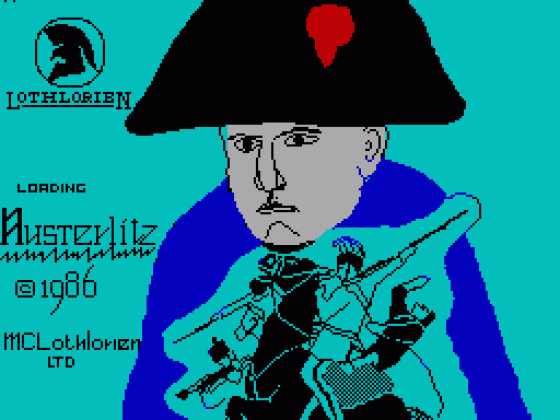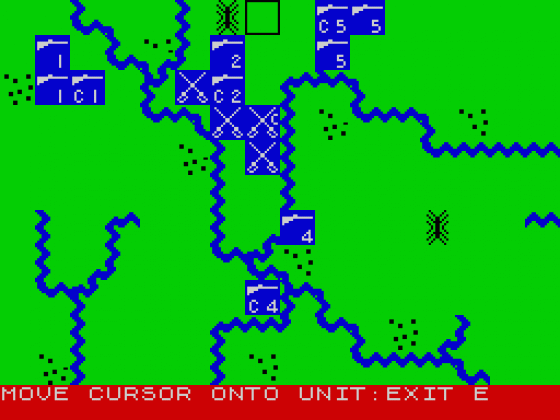
ZX Computing
 1st August 1986
1st August 1986
Categories: Review: Software
Publisher: Lothlorien
Machine: Spectrum 48K/128K
Published in ZX Computing #28
Wargames
By pure coincidence, two wargames specifically for the Spectrum 128K arrived on my desk on the same day. As both are by the same company and one is very good and the other very bad, it is useful to look at them side by side. The company is Lothlorien and the two games are Confrontation and Austerlitz.
Confrontation
Confrontation is a game for two players and attempts to cover scenarios from all over the twentieth century. Seven different scenarios are included in the package and there is also the facility to create your own mini games by first of all drawing up a map from various terrain types and then populating it with tanks, paratroops, flak guns and infantry, etc. The seven scenarios included are Poland, Greece, Desert War, Crete, Afghanistan, Sinai and Angola.
The main problem with the game is that it was originally written back in 1983. In Basic. It's now showing its age in that it is extremely user-unfriendly compared to similar products released today. Drawing your map is done by moving a cursor round the screen and positioning towns and hills etc. Unfortunately, the cursor keys (remember that they are separate keys on the 128) don't work as the instructions claim. Only keys 5-8 (the cursor keys on the original Spectrum) worked. Another problem was that, when I loaded a scenario, the instructions left me unsure as to what I was supposed to be going and my first attempt caused an "integer out of range" error message, whilst my next keypress reset the whole machine!

The only differences between the 48K and 128K versions appears to be that the scenarios sit in RAM in the larger model instead of having to be loaded in separately. If you already have the 48K version, don't bother with the update and if you don't have the earlier version, don't bother anyway.
Scores
Overall 29%
Austerlitz
Austerlitz on the other hand shows how a good wargame should be presented. A large clear display with a well produced instruction booklet and an excellent game to boot. In 1805, Napoleon had manoeuvred his army to Austerlitz where, although heavily outnumbered, he sought to inflict a decisive defeat on the combined forces of the Austro-Russian army. That he did, mainly because his army was much more highly trained and he had better commanders, is a matter of historical record. What you must do is prove that you too possess the strategic and tactical skills of Napoleon. And, in case you get too confident, there are three different skill levels to test you even further.
There are two main features in the game that make it notable. The first is that you have intelligent corps commanders and so can leave a lot of the minor tactics to them (you can also assume total control if you so desire or any combination of the two). The second major feature is that in order to simulate the confusion of battle, there is hidden movement by the Austro-Russian forces. Thus, whlst you can see their initial disposition of forces, as soon as they move, you have no idea of their whereabouts until you rediscover them by combat or intelligence.
The mechanics of the game are fairly standard and feature different terrain types, morale factors and victory conditions. Terrain is important for two main reasons. Firstly, it affects how fast a unit can move through it and secondly, it can also affect the results of combat - it is a lot easier to defend a ridge than a frozen lake or marsh! Morale too is a vital factor. Combat strength is worked out on a basis of 500 men = 1 strength point, so that a unit of 4,500 men would have 9 strength points. If morale is absolutely abysmal, there is no adjustment, but it if is excellent, then that particular unit can get a +6 strength bonus which effectively means another 3,000 men.
Austerlitz is a superbly presented game. The instructions are clear and the booklet also provides a brief summary of the actual historical situation, pen pictures of Napoleon's commanders and a reading list for people who get really interested in the historical aspects. If Napoleon had had this game to play, I can certainly see why he would be saying "Not tonight, Josephine".
Austerlitz Scores
Overall 68%
Other Reviews Of Austerlitz For The Spectrum 48K/128K
Austerlitz (Lothlorien)
A review by Sean Masterson (Crash)
Austerlitz (Lothlorien)
A review by Max Phillips (Your Sinclair)
Austerlitz (Lothlorien)
A review by Jerry Muir (Sinclair User)
Austerlitz (Lothlorien)
A review
Austerlitz (Lothlorien)
A review





